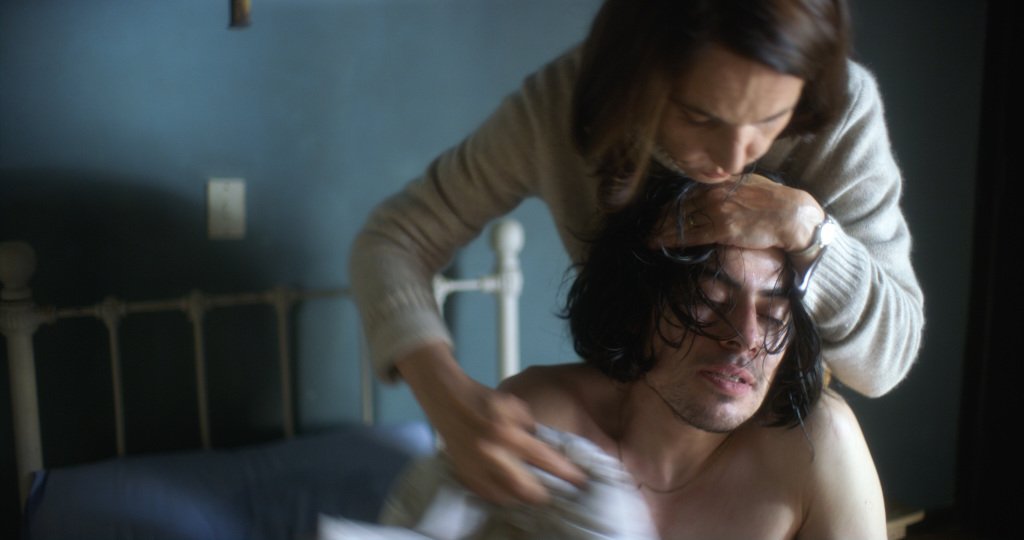Film at Lincoln Center and The Museum of Modern Art have just announced the complete lineup for the 52nd edition of New Directors/New Films, running March 29–April 9 in New York City, screening 27 features and 11 shorts, and presenting films from Argentina, Brazil, Chile, Mexico, and Peru.
This year’s Latin American selection are the feature films Chile ’76 by Manuela Martelli, The Face of the Jellyfish / El rostro de la medusa by Melisa Liebenthal from Argentina, Maputo Nakuzandza by Brazilian director Ariadine Zampaulo, and Tótem by Lila Avilés from Mexico; and the short films Center, Ring, Mall by Peruvian-born director Mateo Vega, Scarce / Escasso by Gabriela Gaia Meirelles and Clara Anastácia from Brazil, and The Spiral by María Silvia Esteve from Argentina. The closing night of the festival will be the feature film Mutt by Chilean-Serbian director Vuk Lungulov-Klotz.
In her gripping debut feature Chile ‘76 constructed with sinister elegance and mounting tension, director Manuela Martelli places the viewer in a historical moment fraught with anxiety: the early years of Augusto Pinochet’s regime in Chile. Her narrative presents Pinochet’s oppressive reign from the unusual and surprising perspective of Carmen (a superb Aline Küppenheim), an upper-middle-class woman whose life begins to unravel after local priest Father Sánchez (Hugo Medina) implores her to use her summer beach house, under renovation, to hide an injured young man (Nicolás Sepúlveda) whom she comes to suspect is a victim of political prosecution. As Carmen descends into danger, she experiences a gradual moral awakening. Martelli’s film is a taut, evocative, and impressively assured depiction of the inescapable, ever-tightening noose of patriarchal, governmental dictatorship and how its effects gradually bleed into our everyday experiences.
A wryly comic examination of the meaning of human identity, Melisa Liebenthal’s film The Face of the Jellyfish follows Marina (Rocío Stellato), a woman in her early thirties who has been stricken with a strange malady: her face has changed. From this simple premise, the director asks how much of our selves and personhood are connected to what we look like, and how difficult it would be simply to start over. Rather than constructing a Kafkaesque dreamscape, Liebenthal grounds Marina’s experiences in the everyday, then expands out to inquire how human individuated identity compares with that of the animal kingdom, incorporating footage of mammals, reptiles, birds, and aquatic species.
In Maputo Nakuzandza, a kaleidoscopic view of a city from dawn to dusk, Brazilian filmmaker Ariadine Zampaulo guides us through Mozambique’s capital, Maputo, where different lives intermingle easily amid the director’s illuminating, distinct approaches and ideas in presenting cinematic poetry. Workers and tourists, joggers and dancers, real and fictional, move through the bustling and unpredictable urban landscape, each at their own pace and rhythm. Amidst it all, a mysterious woman in a bridal gown and veil wanders ghostlike after having left her cheating husband at the altar. With its repeated gestures and moments of human interconnection, Maputo Nakuzandza, whose threads are united by the ambient sounds of a local radio program, is a triumph of elegant freeform filmmaking.
Fresh from its world premiere at the Berlin Film Festival, the enormously poignant follow-up to her international breakthrough, The Chambermaid (a selection of New Directors/New Films 2019), director Lila Avilés nestles in with one family over the course of a single, meaningful day. Tótem is told largely from the perspective of 7-year-old Sol (the marvelously naturalistic Naíma Sentíes), as her mother (Montserrat Marañón) and extended relatives prepare for the birthday party of the girl’s father (Mateo Garcia). As the hours wear on, building to an event both anticipated and dreaded, the fragile bonds and unsure future of the family become ever clearer. Avilés confirms her formidable skill at expressing the subtlest contours of her characters’ inner lives in this emotionally expansive and affecting drama.
In Mutt, over the course of 24 breathless hours in New York City, twentysomething Feña (electrifying newcomer Lío Mehiel, winner of a Special Jury Award at Sundance for their performance) must contend with an onslaught of aggravations, surprise encounters, and emotional choices. Feña unexpectedly reconnects with an estranged ex-boyfriend (Cole Doman), is suddenly saddled with his wayward little sister (MiMi Ryder), and nervously awaits their father (Alejandro Goic), who’s arriving from Chile for a visit that promises to be anything but easy. Feña must stay afloat and resilient amidst all this despite being driven to a near breaking point. With precision and sensitivity, first-time director Lungulov-Klotz has confidently, lovingly constructed a day in the life of a young trans man whose every action is a negotiation among a difficult past, an unsettled present, and an unknown but hopeful future.
Provocatively abstracted 16mm images and animated 3D renderings are interposed with incantatory, multilingual voiceover tracks in Mateo Vega’s Center, Ring, Mall, a vivid portrait of three infrastructural totems: an Amsterdam data center whose servers facilitate global communication networks; a peripheral ring road encircling the city; and a vacant shopping mall, a once-bustling emblem of unbridled consumerism gone to seed.
“I’m not crazy, I’m just heartbroken” appears in neon yellow text over a kaleidoscopic rainbow spiral. A chaotic symphony composed of hypnotic images and WhatsApp voice messages, narrated by a nameless protagonist on the brink of a health-related panic attack, results in a striking exploration of anxiety, identity, and how we find a sense of home in the Argentine short The Spiral by María Silvia Esteve.
While walking a dog, self-proclaimed “pet professional” Rose encounters an open apartment empty of its residents. Rose decides to stay, embedding herself in the space amid the owner’s belongings and casually conjuring an imagined friendship with the absent lady of the house. A brilliant mockumentary, the Brazilian short Scarce by Clara Anastácia and Gabriela Gaia Meirelles is a profound and playful portrait of life in contemporary Brazil and the lasting reverberations of colonialism.





